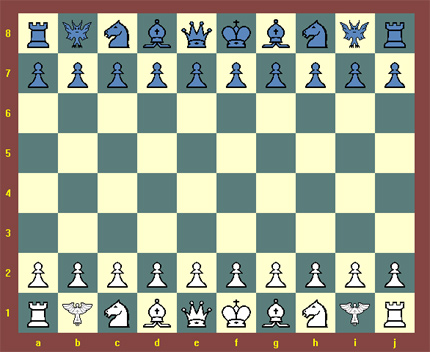Angels and Devils
Setup
 | White: King f1; Queen e1; Angel b1, i1; Rook a1, j1; Knight c1, h1; Bishop d1, g1; Pawn a2, b2, c2, d2, e2, f2, g2, h2, i2, j2. Black: King f8; Queen e8; Devil b8, i8; Rook a8, j8; Knight c8, h8; Bishop d8, g8; Pawn a7, b7, c7, d7, e7, f7, g7, h7, i7, j7. |
Pieces
All pieces are as in Orthodox Chess, with the following additions:
Angel: The Angel jumps exactly 2 or 4 squares horizontally or vertically, possibly capturing an enemy piece on the landing square. Additionally, the Angel captures any enemy pieces it jumps over when moving. This is not an optional ability; all enemy pieces lept over are always captured. An Angel can capture up to 4 pieces at a time (if the opponent is silly enough to line that many pieces up in a row.)
Devil: The Devil jumps exactly 2 squares horizontally or vertically (like a Dabbabah.) It may capture any piece on the landing square, friendly or enemy, so long is it is not the friendly King (as that would end the game.) Additionally, whenever it completes a move, it "burns" all enemy pieces located on the four orthogonally adjacent squares. This is not optional; whenever completing a move, all orthogonally adjacent enemies are burned. The Devil can capture up to 5 pieces at a time. NOTE: The burning only happens when the Devil moves. If a white piece moves to a square which is orthogonally adjacent to a Devil, it is safe until the Devil moves again. This piece was inspired by the Fire Demon from Tenjiku Shogi.
Although the Angel and Devil have different moving and capturing capabilities, their material value appears to very close.
Rules
All Orthodox Chess rules apply, unless otherwise noted. The goal of the game is to Checkmate the enemy King. If the King of the player to move cannot make a move to a square where he is safe from capture, but is not attacked on the square he is on, and no other move can be made, than this situation is Stalemate. Stalemate is a draw. Three-time repetition of a position is also a draw, as is fifty full moves without a pawn being moved or a piece being captured.
Castling is as in Capablanca's Chess, with the King moving three squares left or right toward the Rook, and the Rook leaping over the King to the next square. Castling must be made under the usual restrictions. That is, the King cannot be in Check, and cannot move through Check or into Check.
 This 'user submitted' page is a collaboration between the posting user and the Chess Variant Pages. Registered contributors to the Chess Variant Pages have the ability to post their own works, subject to review and editing by the Chess Variant Pages Editorial Staff.
This 'user submitted' page is a collaboration between the posting user and the Chess Variant Pages. Registered contributors to the Chess Variant Pages have the ability to post their own works, subject to review and editing by the Chess Variant Pages Editorial Staff.
By Greg Strong.
Web page created: 2005-07-01. Web page last updated: 2005-07-01
